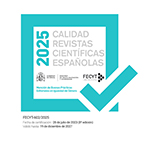Cuando uno no basta. La percepción profesional de la eficacia de los mecanismos tradicionales de autorregulación periodística en el nuevo contexto del periodismo
Resumen
El propósito de este texto es analizar la percepción de los periodistas españoles respecto a la mayor o menor eficacia de algunos mecanismos tradicionales de autorregulación periodística en comparación con otros mecanismos nuevos que han surgido en los últimos años especialmente a partir de la llegada de las tecnologías digitales. Los resultados de las encuestas (n=420), entrevistas en profundidad (n=30) y los grupos de discusión mantenidos (n=6) confirman la aceptación de estos mecanismos si bien esta aceptación tiende a ser mayor en la medida en que todos ellos funcionen como un sistema, puesto que considerados individualmente ninguno de ellos resulta ser tan efectivo como para asegurar automáticamente un comportamiento más ético. El mecanismo más eficaz parece ser la presión ciudadana a través de las redes sociales mientras que la existencia de un posible sello o certificado de sostenibilidad ética recibe una evaluación parecida a la de otros mecanismos más clásicos. Por encima de todos, ellos la ética personal de cada periodista resulta irremplazable.Descargas
Descarga artículo
Licencia
La revista Estudios sobre el Mensaje Periodístico, para fomentar el intercambio global del conocimiento, facilita el acceso sin restricciones a sus contenidos desde el momento de su publicación en la presente edición electrónica, y por eso es una revista de acceso abierto. Los originales publicados en esta revista son propiedad de la Universidad Complutense de Madrid y es obligatorio citar su procedencia en cualquier reproducción total o parcial. Todos los contenidos se distribuyen bajo una licencia de uso y distribución Creative Commons Reconocimiento 4.0 (CC BY 4.0). Esta circunstancia ha de hacerse constar expresamente de esta forma cuando sea necesario. Puede consultar la versión informativa y el texto legal de la licencia.










